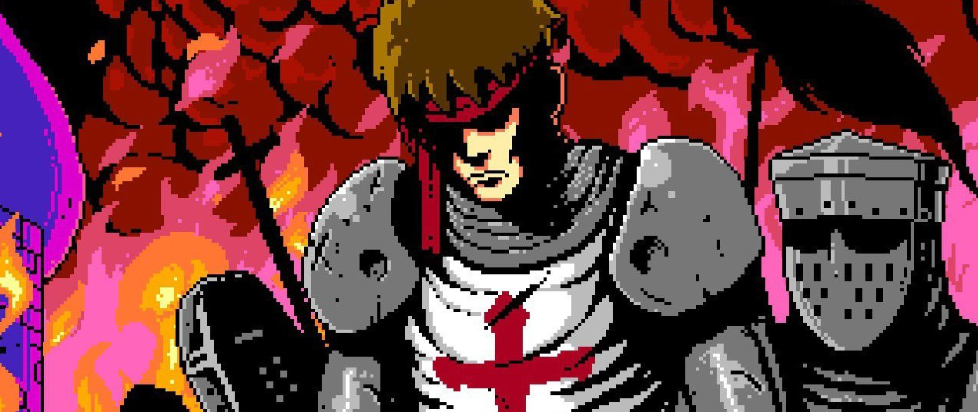
Me, My Wife and Eye-rene

This column is a reprint from Unwinnable Monthly #164. If you like what you see, grab the magazine for less than ten dollars, or subscribe and get all future magazines for half price.
———
Wide but shallow.
———
As I accumulate years like layers of sediment, I fear the intrusion of nostalgia more and more. Not that such reveries are all poison per se, but when I think of the comfort found in dawdling with ghosts and smeared reflections of the past, the potential contentment seems inescapable. The antipodal thrill of some newfound experience dwindles as nostalgia’s blanket of solace calls out with amped clarity day after day, and already with videogames I find myself drawn to new titles merely one or two leaves removed from the classics on the inspirational family tree.
This means two-dimensions, jumping, laying waste to wandering hordes, four channels between left and right and scanlines blooming through the bits. And when I’m ambling around PAX East considering what to slow down for, a couch plucked from an ‘80s basement slams my nostalgia-tuned cerebellum despite my efforts at constantly honing my edge. Though to be completely honest, I’d already made an appointment because an expansion subtitle as violently punny as Deux or Die is one that I couldn’t help but investigate.
I’m referring to Infernax, a flash game rebuilt in pixels a couple of years ago that the developers accurately pitched to me as a blend of Simon’s Quest and The Adventure of Link (a game with such delectable jumping down-stab attacks and multi-sensory hit-the-weak-spot stimulation so as to be an entire genre of personal nostalgia in itself). With the Deux or Die update the player now controls two crusaders returning from their violent colonialism to find a biblically adjacent evil version of the same taking root in their vaguely European home. From there it’s screen after screen of mopping up bloody evil, some choices that bend towards chaos or peace though not always obviously, upgrades, missions, blocked pathways and homages to their inspirations.
All of this is dutifully collected and well-crafted, a clear labor of reverence to an age where design conventions and translations were yet solidified. I hadn’t played Infernax solo, but given the forty-plus hours I’ve put into the Deux or Die expansion with my wife, I gather that playing solo was an even more tense exercise in pattern memorization, reflex-honing and just knowing when to say “fuck it” and blast past the madness onscreen. I can’t say whether or not this was particularly engaging beyond that exercise in revisiting the past but with inverted crosses and demon guts spilling out left and right. The itch would have been scratched but not soothed, or so I imagine.

But the Deux or Die update nudged the formula just enough to pull away from simple worship of how things used to be. The second character joining the original’s Duke Alecedor is his squire Cervul, and he brings along four upgradable weapons (well, eight actually, depending on choices made) along with a million axes to lob about. He doesn’t change the story, merely serving the Duke and keeping close, but his presence shifted the game from something I might blast through for a squiggly feeling of the old days and then moved on from to a delightful local stress relief for my wife and me after the manufactured drudgery of our day jobs.
Her favorite part was when we first dabbled in evil and she gained access to what we called Eye-rene, a little eyeball demon that she could toss out and which would spawn versions of the same floating eyeballs that the player usually has to pick away at, but this time working for us. Our routine then became 1) enter new screen, 2) toss out Eye-rene, 3) let her cook and 4) mow down the remainders. We swore to never leave Eye-rene behind and always used the recall button so that Cervul would hold out his arms in a mothering come-hither way until Eye-rene was nestled back in our loving embrace and we could move on. This, and later the jet pack cheat code, really let us fly through the game, slamming the visual and sonic pleasure spikes as enemies fell before us (well mostly Eye-rene) on our quest to secure every ending.
Deux or Die added that extra layer to an already well-executed nod to the old ways, shifting things forward enough to freshen the experience. I have plenty of memories of passing the controller but few games let two players crawl through the maze together, cracking jokes and building their own meta-narrative around the thinly scaffolded slash n’ dash experience. It’s just that bit more mutually engaging, both audience and player, equally complicit in our watery deaths and maybe spamming too many grenades, laughing along to mistakes and cheering at the cracked jewels and cult takedowns.
Which is the best way to cut nostalgia, with a little bit of something new. Too much fear of the past is as unhealthy as a thoughtless drive towards the future. It’s nice to revel in the old feelings, in a way that renders them electric again alongside your partner in life and demonic eradication.
———
Levi Rubeck is a critic and poet currently living in the Boston area. Check his links at levirubeck.com.




